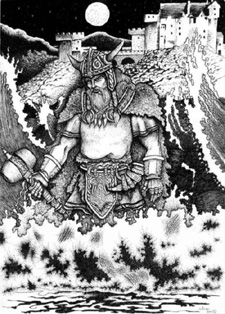
War page
ancient polytheism:
Egyptian Overview
Norse Overview
War Deities
Underworld Deities
 Thor, the Norse god of war and bravery was portrayed as the epitome of the Norse barbarian (which, unlike the general current meaning, included bravery as a characteristic). Short and stocky with a red beard and a massive, bulky body, Thor represented what the Norse believed every warrior should aspire to be. Thor also represented the "manly" vision of the warrior by drinking and eating plentifully.
Thor, the Norse god of war and bravery was portrayed as the epitome of the Norse barbarian (which, unlike the general current meaning, included bravery as a characteristic). Short and stocky with a red beard and a massive, bulky body, Thor represented what the Norse believed every warrior should aspire to be. Thor also represented the "manly" vision of the warrior by drinking and eating plentifully.As appropriate for the god of war, Thor wore iron gloves and always carried with him Mjollnir, his huge, magical warhammer. Thor, as the barbaric god, believed in brute strength and pure force over careful planning and thought--and his weapon of choice, the warhammer, represented his belief well.
Thor was not only the god of war to the mortals, but also served his purpose among the Norse pantheon as the guardian of Asgrad, the home of the gods, and the Champion of the Aesir, the ruling "race" or cult of gods. When the Aesir needed a combatant for any reason, Thor was the one they called on to serve them. However, in a sense, Thor left careful planning of combat for his belief in brute force, so he often made mistakes, such as when he was tricked during a drinking contest with a giant, during which he perceptibly lowered the sea.
As the example for all barbarians to follow, it was necessary for Thor to be used to show caution for barbarians, as well. For example, in one story regarding Thor, he dressed as a bride as a trick, and succeeded only in humiliating himself. Such stories served to caution barbarians to be cautious, and some of the stories show Thor as making mistakes when drunk, so those serve to caution that barbarians should not engage too heavily in drinking.
In addition to being the god of war, Thor was also the god of the stormy skies. This realm was probably attributed to him later, because his hammer supposedly mimicked the sound of thunder. His hammer, a symbol of protection as well as one of thunder, was used in ceremonies to create the effect of thunder.

Greek

Egyptian

Norse